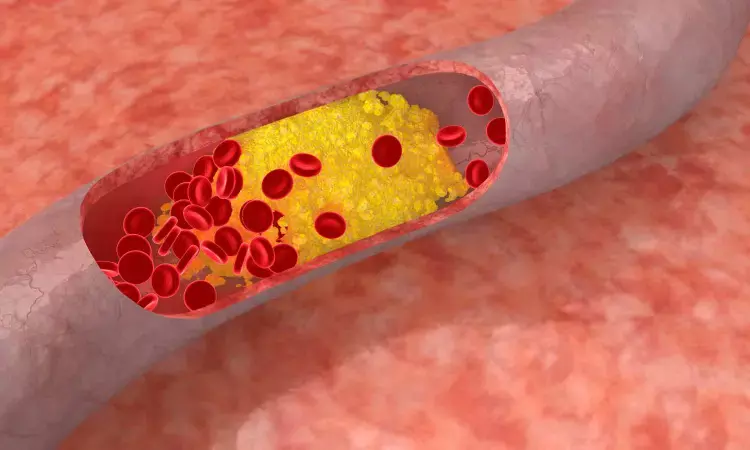- Home
- Medical news & Guidelines
- Anesthesiology
- Cardiology and CTVS
- Critical Care
- Dentistry
- Dermatology
- Diabetes and Endocrinology
- ENT
- Gastroenterology
- Medicine
- Nephrology
- Neurology
- Obstretics-Gynaecology
- Oncology
- Ophthalmology
- Orthopaedics
- Pediatrics-Neonatology
- Psychiatry
- Pulmonology
- Radiology
- Surgery
- Urology
- Laboratory Medicine
- Diet
- Nursing
- Paramedical
- Physiotherapy
- Health news
- Fact Check
- Bone Health Fact Check
- Brain Health Fact Check
- Cancer Related Fact Check
- Child Care Fact Check
- Dental and oral health fact check
- Diabetes and metabolic health fact check
- Diet and Nutrition Fact Check
- Eye and ENT Care Fact Check
- Fitness fact check
- Gut health fact check
- Heart health fact check
- Kidney health fact check
- Medical education fact check
- Men's health fact check
- Respiratory fact check
- Skin and hair care fact check
- Vaccine and Immunization fact check
- Women's health fact check
- AYUSH
- State News
- Andaman and Nicobar Islands
- Andhra Pradesh
- Arunachal Pradesh
- Assam
- Bihar
- Chandigarh
- Chattisgarh
- Dadra and Nagar Haveli
- Daman and Diu
- Delhi
- Goa
- Gujarat
- Haryana
- Himachal Pradesh
- Jammu & Kashmir
- Jharkhand
- Karnataka
- Kerala
- Ladakh
- Lakshadweep
- Madhya Pradesh
- Maharashtra
- Manipur
- Meghalaya
- Mizoram
- Nagaland
- Odisha
- Puducherry
- Punjab
- Rajasthan
- Sikkim
- Tamil Nadu
- Telangana
- Tripura
- Uttar Pradesh
- Uttrakhand
- West Bengal
- Medical Education
- Industry
Lower Adiponectin and Higher Leptin Levels Linked to Increased Remnant Cholesterol, finds study

Researchers have established the relationship of low adiponectin and higher leptin levels with the level of remnant cholesterol at baseline and throughout the duration of study, as providing insights into how the fat content influences the cardiovascular health of an individual. The Multi-Ethnic Study of Atherosclerosis (MESA) has examined the association between adipokines; endogenous hormones from the tissue of adipose, and remnant cholesterol in providing insight about obesity's role in atherosclerotic cardiovascular disease. The study was published in The Journal of The American Heart Association by Quispe and colleagues.
Among several risk factors for cardiovascular diseases (CVD), obesity plays an important role due to the participation of triglyceride-rich lipoproteins and remnant particles, which are highly atherogenic. Adipokines, such as adiponectin, leptin, and resistin, are hormones produced by adipose tissue that could be playing a role in determining CVD risk. Elucidating the association of these adipokines with remnant cholesterol may help in reducing mechanisms through which obesity may relate to atherosclerosis.
The subjects were 1,791 MESA participants, and the body composition evaluation as well as levels of adipokines was performed at either visit 2 or visit 3. Adiponectin, leptin, and resistin were measured, and remnant cholesterol (RC) was defined as non–high-density lipoprotein cholesterol minus low-density lipoprotein cholesterol. Measurements of levels of RC in participants were carried out at follow-up visits (4 through 6), with the application of multivariable adjusted linear mixed models to study cross-sectional and longitudinal associations between levels of adipokines and log-transformed RC values.
Participants' average age was 64.5±9.6 years old and had a mean body mass index of 29.9±5.0 kg/m².
52% participants were females
For every 1-unit increase of adiponectin, RC levels dropped by 14.6% (95% CI, 12.2–16.9).
On the contrary, for every 1-unit increase in leptin, RC levels increased by 4.8% (95% CI, 2.7–7.0), and for resistin, the increase was 4.0% (95% CI, 0.2–8.1).
The longitudinal analysis further added that lower adiponectin and higher leptin were associated with increases in RC over a median follow-up period of 5 years (IQR, 4–8).
Longitudinal Associations The relation between adipokines and RC was also present throughout the 5-year follow-up period. Low adiponectin levels were associated with persistently elevated RC levels, whereas high leptin levels remained associated with continued increase in RC levels over time. These associations remained present even after adjustment for BMI, diabetes, LDL-C, and lipid-lowering therapy.
The study results indicate that lower adiponectin and higher leptin levels are independently associated with a higher level of remnant cholesterol at baseline and longitudinally. Such findings would uphold the complex role of adipokines in lipid metabolism and cardiovascular disease risk, as correction of these hormonal imbalances may be critical in obese patients in managing atherosclerosis and preventing cardiovascular events.
Reference:
Quispe, R., Sweeney, T., Martin, S. S., Jones, S. R., Allison, M. A., Budoff, M. J., Ndumele, C. E., Elshazly, M. B., & Michos, E. D. (2024). Associations of adipokine levels with levels of remnant cholesterol: The Multi‐Ethnic Study of Atherosclerosis. Journal of the American Heart Association. https://doi.org/10.1161/jaha.123.030548
Dr Riya Dave has completed dentistry from Gujarat University in 2022. She is a dentist and accomplished medical and scientific writer known for her commitment to bridging the gap between clinical expertise and accessible healthcare information. She has been actively involved in writing blogs related to health and wellness.
Dr Kamal Kant Kohli-MBBS, DTCD- a chest specialist with more than 30 years of practice and a flair for writing clinical articles, Dr Kamal Kant Kohli joined Medical Dialogues as a Chief Editor of Medical News. Besides writing articles, as an editor, he proofreads and verifies all the medical content published on Medical Dialogues including those coming from journals, studies,medical conferences,guidelines etc. Email: drkohli@medicaldialogues.in. Contact no. 011-43720751


